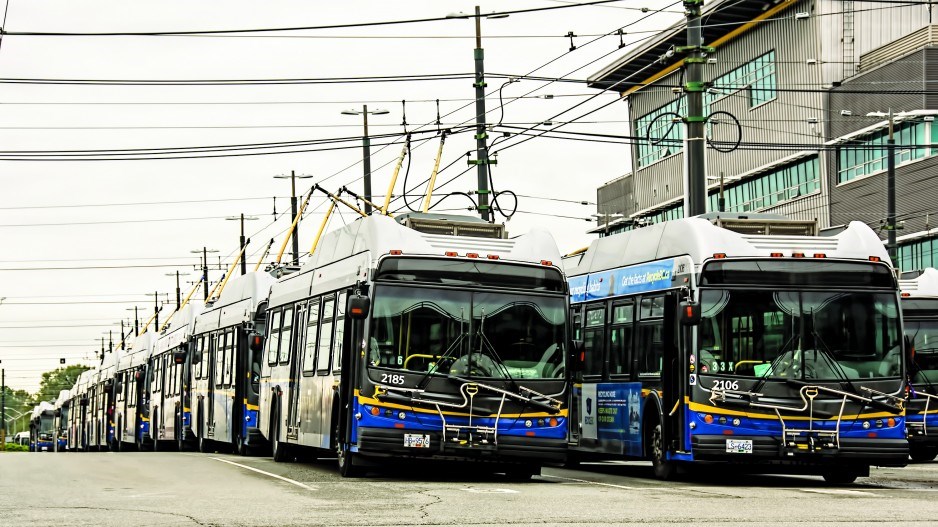TransLink’s plan to decommission the remnants of a Fraser River waterfront sawmill could harm endangered white sturgeon, according to the Ministry of Forests.
TransLink has budgeted $300 million to build the Marpole Transit Centre for 300 battery electric and conventional buses by 2027 on industrial land at the foot of Heather Street in Vancouver.
A late 2023 report on the agency’s application to build a flood protection structure on Crown land was released under freedom of information to Stanley Tromp, one of the Marpole residents seeking riverfront access after the city’s 2014-envisioned, 10-acre park was scuttled.
The ministry’s report said the removal of old concrete, asphalt, docks, piles and sheds must be done in such a way to minimize any impact on the fish. So TransLink retained WSP Canada to develop mitigation measures in its environmental management plan (EMP).
In-water construction activities “whenever possible” must be limited to the months of December to February when white sturgeon are least-likely to be present in or migrating through the area.
"While this recommended mitigation measure was initially developed for the Port Mann Bridge, it has since been applied to other projects in the Fraser River and remains applicable to the proposed works described in the EMP,” said the ministry report by senior licensed authorizations officer Tyler Kang.
During other parts of the year, crews would use site-scan sonar surveys to monitor for sturgeon before in-water construction. Work would not happen until any sturgeon spotted in the immediate area are observed leaving. Crews would use “a ramp-up technique” for noisy, in-water machinery or equipment “to allow time for sturgeon and other aquatic wildlife to leave the work area.”
Terry Slack fished in the North Arm of the Fraser for 60 years and was a founding member of the Fraser River Sturgeon Conservation Society. He said the area in front of the TransLink property is “really important because it's right, smack-dab in the way in what we call the transition zone.”
“That break between fresh water and incoming salt water is important,” Slack said. “They have to acclimatize, they have to stop, they have to take some time and, especially juvenile salmon, especially sockeye, to change from fresh to salt water. I don't see that in the report. That disturbs me.”
Slack said the area is also popular for spawning oolichan and wonders whether TransLink is “just charging ahead.”
“If the waterfront walkway is going to affect the transition zone, then we have to rethink that. But I don't think it will be, if it’s done properly,” Slack said.
The Marpole Residents Coalition has lobbied officials for more than two years for riverfront access. Vancouver city council approved the idea in principle last July, subject to reaching an agreement with the Musqueam Indian Band.
“Most public comments were to oppose the application unless TransLink is committed to a public walkway on the filled foreshore area,” the ministry report said. “Also, the public raised environmental concerns about potential impact of the proposed sheet pile wall at the site to fish and fish habitat (e.g. salmon) as well as potential contamination associated with the proposed work.”
The ministry report said the riverfront walkway was separated from the application and will be considered once TransLink receives direction from the city and First Nation. TransLink's proposed design includes access to the foreshore on both the east and west sides that can facilitate connection to a riverfront pathway.
According to a prepared statement from TransLink, the agency continues work on obtaining necessary permits, agreements on site features and dealing with the Musqueam and city hall on next steps.
“No agreement or final decision has been made,” TransLink said.
“We are currently undertaking ground preparation and pre-construction work at the site. Ground improvement work begins this month. … Retaining wall, on-site utility, and flood construction wall work will commence later this year.”
The report recommended the ministry issue an interim licence of occupation for a six-year-term to TransLink, leading to a statutory right of way pending completion of a legal survey. No rent or security payments would be charged, but $2 million commercial general liability insurance would be required.
The report released to Tromp was partially censored because the government claimed it contained policy and legal advice, and information potentially harmful to intergovernmental relations, conservation of heritage sites and third-party business interests.


